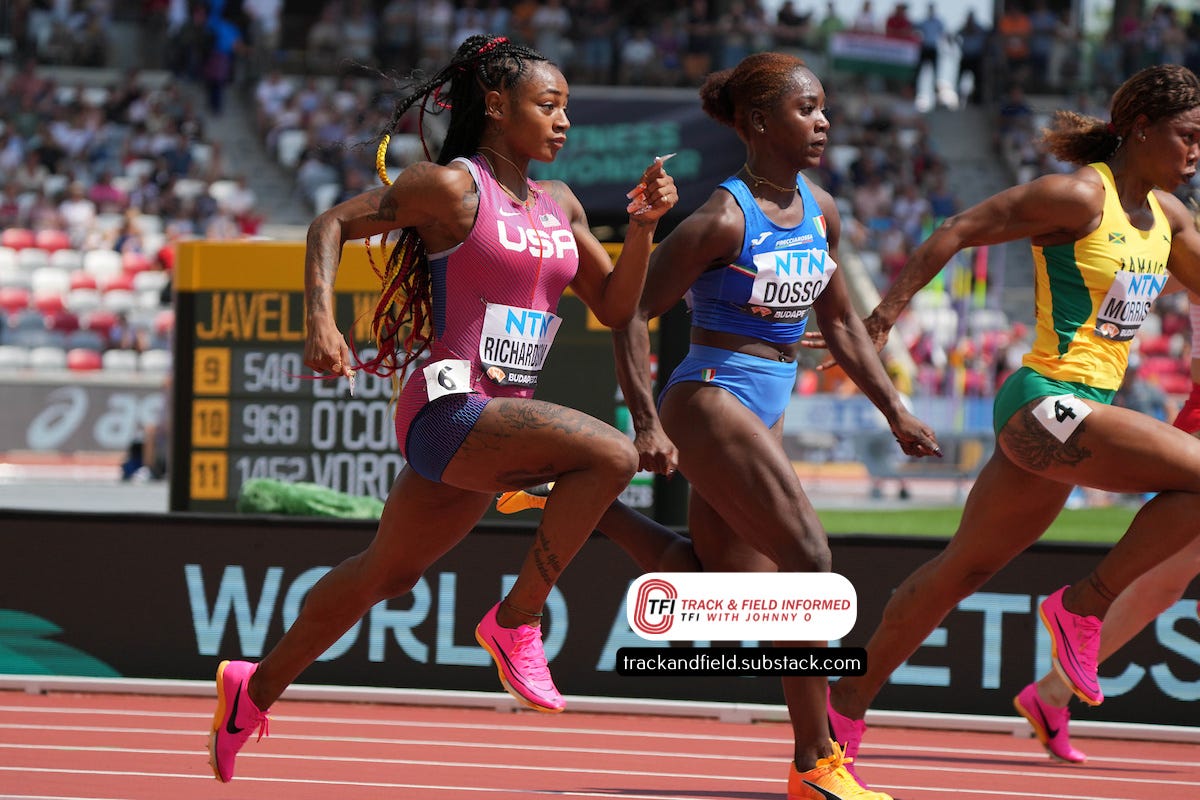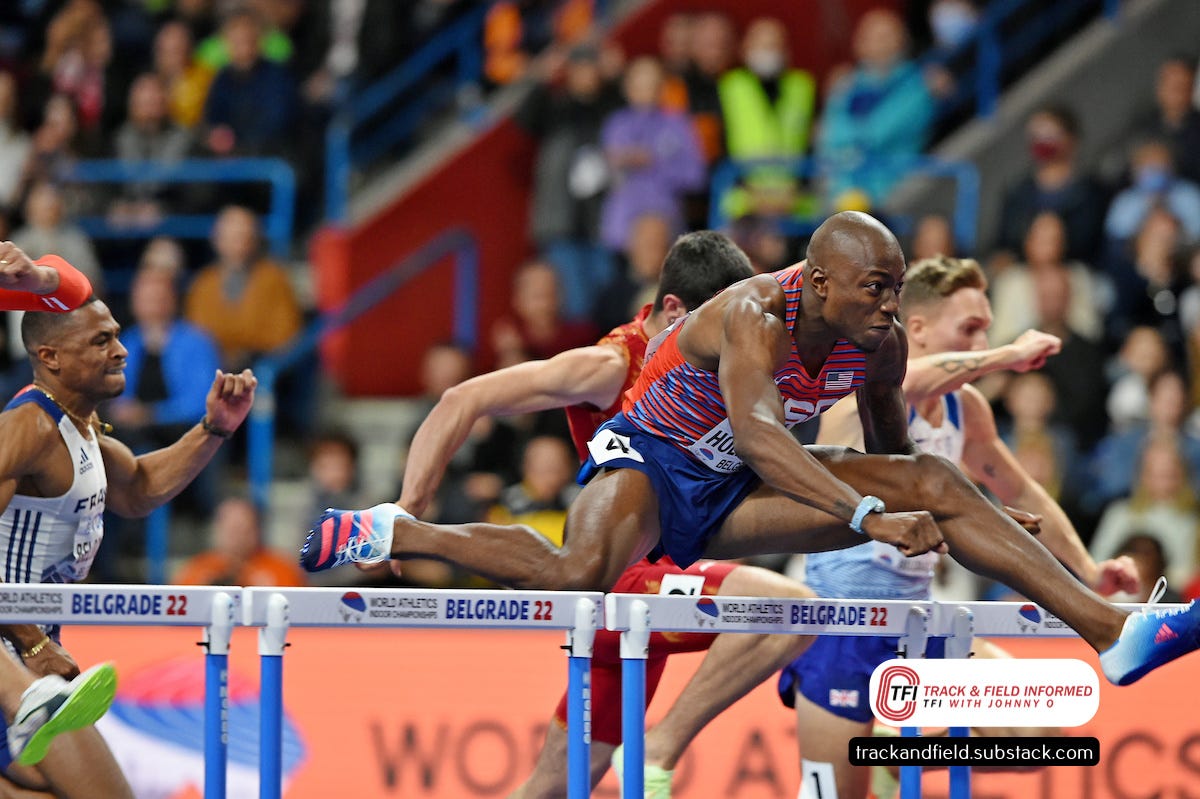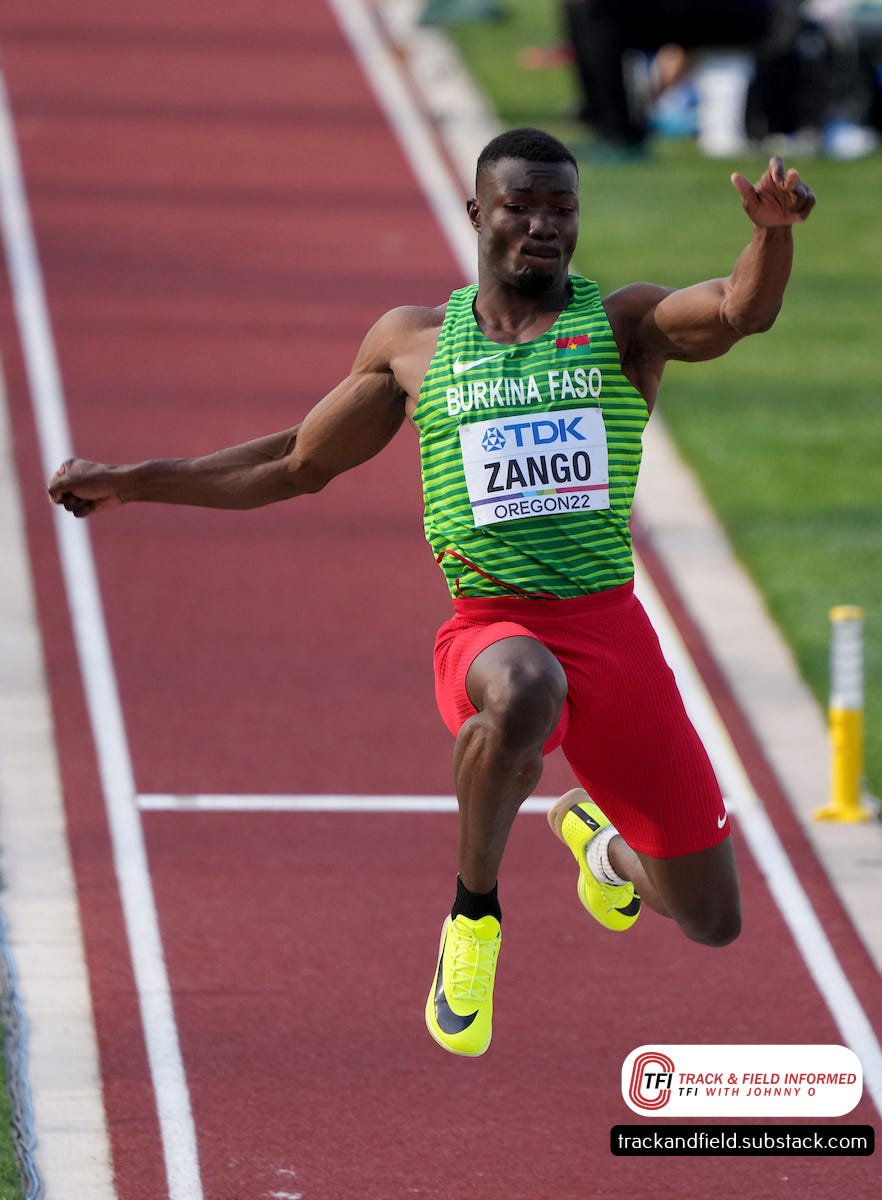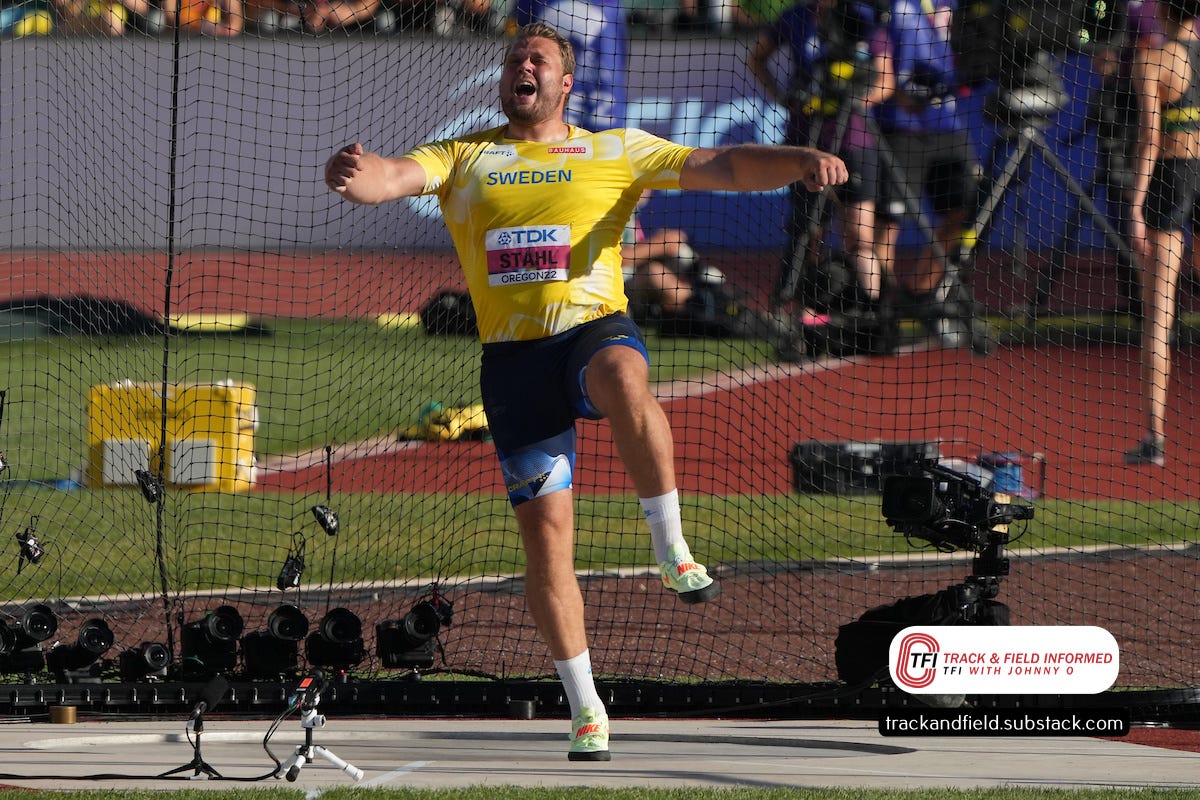Richardson's transformation is complete
Sprinter's victory in World Champs shows past struggles are behind her

Any doubts about the transformation of Sha’Carri Richardson should have been laid to rest in the World Athletics Championships in Budapest, Hungary on Monday.
That’s when, shortly before 10 p.m., local time, the American sprinter won the women’s 100 meters in a meet-record and personal-best time of 10.65 seconds.
Running in lane 9 after finishing third in 10.84 in a stacked semifinal that included first-place Shericka Jackson of Jamaica (10.79) and second-place Marie-Josee Ta Lou of Ivory Coast (10.79), Richardson got off to a solid start in the final and then used her superior top-end speed to carry her to a large enough margin of victory that she was able to raise her arms in triumph in the last stride or two of the race.
Jackson, who had looked great in her semifinal, finished second in 10.72, followed by countrywoman and two-time defending champion Shelly-Ann Fraser-Pryce in 10.77, Ta Lou in 10.81, and Julien Alfred of St. Lucia in 10.93.
Richardson’s time, which was run into a slight breeze of 0.2 meters per second, trimmed two hundredths of a second off the meet record that Fraser-Pryce had set last year in Eugene, Oregon while winning the fifth title of her illustrious career. Richardson’s performance also sliced six hundredths of a second off the 10.71 personal best she had set in a first-round heat of the USA Track & Field Outdoor Championships on July 6, and moved her into a three-way tie for fifth on the all-time world performer list with Marion Jones of the U.S. and Jackson.
Richardson seemed to be in shock for about the first minute and a half after she had finished. But then, after Fraser-Pryce, Dina Asher-Smith of Great Britain, Jackson, and one of her American teammates had given her congratulatory hugs, she jumped up and down and let out a loud “Yeeeeeah.”
“I feel amazing,” Richardson told Eurosport. “I feel like hard work pays off. I’ve been dedicating myself. I’ve been keeping my faith strong this season and just believing and knowing whatever you practice is what you put forward, and I’m grateful.”
The 34-year-old Ta Lou and the 23-year-old Richardson had been the top two female sprinters on the planet this season, with each of them twice defeating Jackson. But there were plenty of people who figured the 29-year-old Jamaican would reign supreme when it mattered most at the World Championships.
Part of that was probably due to the fact that Jackson had run a yearly world-leading time of 10.65 in the Jamaican Championships and had finished second behind Fraser-Pryce in the 100 in last year’s meet before winning the 200 with the second fastest time in history.
Some of it could also be attributed to Ta Lou’s history of finishing just out of the medals in the World Championships and Olympic Games.
In the case of Richardson, it was no doubt based on the fact that she entered this season with a reputation for being a sprinter with immense talent, but one who often had drama swirling about her that negatively affected her performances.
Among other things, there was the positive drug test for the metabolite THC, the main psychoactive component of marijuana, that nullified her victory in the 2021 U.S. Olympic Trials, and thus prevented her from running in the Games in Tokyo.
Then came last year, when she ran well during the first part of the season, but did not advance out of the first round of the 100 in the USATF meet and was eliminated in the semifinals of the 200.
However, things had been much different this year.
She opened her season with wind-aided times of 10.75 and 10.57 in the heats and final of the Miramar Invitational in Florida on April 8 before she ran 10.76 to defeat Jackson (10.85) in her next 100-meter race that was run in the Diamond League opener in Doha, Qatar on May 5.
Her performance, which marked the first time in her career that she run at a particularly high level outside of the U.S., was impressive. But what made a bigger impression on me was a minute-long video she had posted before the meet in which she seemed very much at peace with herself and said, in a nutshell, that fear had played a big part in the pain she had experienced and the things that had happened to her.

She then proceeded to win the 100 and place second in the 200 in the USATF meet in early July before defeating Jackson, 10.76 to 10.78, in a Diamond League meet in Chorzow, Poland on July 16.
Everything appeared to be going swimmingly for Richardson at that point, but Alfred defeated her in a 100-meter race in Szekesfehervar, Hungary two days later and she pulled out of a Diamond League meet in London five days after that due to hamstring issues.
She looked good when she ran 10.92 in her first-round heat of the World Championships on Sunday, but she had a terrible start in her semifinal on Monday and had to make up a lot of ground in the second half of the race just to finish five hundredths of a second behind Jackson and Ta Lou, each of whom eased up in the final 15-20 meters of the race.
NBC Sports’ Ato Boldon said before the final that Richardson had to get a much better start if she was going to contend for the gold medal and she did.
Her reaction time of .222 in the semifinals had ranked 23rd out of the 24 women who ran in that round. But that figure was .156 in the final, which meant she had a much smaller deficit to make up on the leaders in the latter half of the race.
Fraser-Pryce, who did not run her first race of the season until July 20 because of injuries, got off to a good — but not great — start and Jackson had pulled alongside her 30-35 meters into the race. Richardson was in fifth place at the 50-meter mark, but she was running faster than anyone in the field and she overtook Jackson with about 20 meters left in the race.
“I was by myself in my own world, which honestly has been like that all my life,” she said of running in lane 9 while Jackson was in lane 4 and Fraser-Pryce was in lane 5. “I’ve always been in my own world, my own element, so being in lane 9 was perfect for me to do what it is I know to do and to focus in more on myself. And when I celebrated it was because I felt like I did my best no matter what the result was going to be. I felt like I did my best.”
The women’s 100 was one of four finals held on Monday.
The other three were the men’s 110-meter high hurdles, which was won by Grant Holloway of the U.S., the men’s triple jump, in which Hugues Fabrice Zango of Burkina Faso won the gold medal, and the men’s discus, which was won by Daniel Stahl of Sweden.
Holloway, the two-time World defending champion in the high hurdles, had entered the meet as the favorite and the 25-year-old dominated all three rounds.
He won the final in a season best of 12.96 to finish more than a tenth of a second in front of Olympic champion Hansle Parchment of Jamaica, who finished second in 13.07.
Daniel Roberts of the U.S. placed third in 13.09, followed by countryman Freddie Crittenden in 13.16, and Japan’s Shunsuke Izumiya in 13.19.
That came after Holloway had the fastest time in the semifinals with a 13.02 clocking, that was .13 seconds faster than the second-fastest time of 13.15 posted by Frenchman Sasha Zhoya.
American Cordell Tinch, who had run a personal best of 12.96 in June, did not advance to the final after finishing fourth in 13.31 in the same semifinal as Holloway.
Parchment had upset Holloway for the Olympic title when he ran him down over the final 10 meters of the race, but Holloway made sure that didn’t happen again by getting off to one of typically great starts and never giving the Jamaican or anyone else in the field a real chance at catching him.
Roberts and Crittenden were actually running in second and third place at the midway point of the race, but they could not hold off Parchment’s typically strong charge over the final four barriers.

Holloway’s time was tied for the second fastest of his career and it marked the sixth time he has run under 13 seconds. But perhaps more significantly, it made him the second man in history to win three consecutive titles.
The first was American Greg Foster, who passed away earlier this year. Foster won the high hurdles in the first three World Championships, which were held in Helsinki in 1983, Rome in ’87, and Tokyo in ’91.
“Rest in peace Greg Foster. He was the last person to do the threepeat,” Holloway said to NBC Sports’ Lewis Johnson. “And for me to have my names in the textbooks or the history books with him… is always great. But I’m trying to get to the point where I want to be one of the greats. I always say, first it’s Allen, then it’s Aries, and then there’s me.”
Allen Johnson, the 1996 Olympic champion, won four World titles during his career and also broke the 13-second barrier 11 times.
Fellow American Aries Merritt set the world record of 12.80 in 2012 and ran under 13 seconds eight times.
The men’s triple jump was expected to be a battle between the 30-year-old Zango and 18-year-old Jamaican Jaydon Hibbert, but Hibbert pulled up on his first jump of the competition, grabbing his right hamstring. He never jumped again.
Hibbert had set world U20 (under 20) and collegiate records of 17.54 meters (57 feet 6½ inches) indoors and 17.87 (58-7½) outdoors while competing for the University of Arkansas this season. He had posted the top mark of 17.70 (58-1) during qualifying on Saturday, but his injury prevented him from matching or topping that mark on Monday.
With Hibbert sidelined, Lazaro Martinez of Cuba was expected to be Zango’s biggest challenger for the gold medal.
Zango took the lead in the first round with a jump of 17.37 (57-0), but Martinez moved into first place in the second round when he bounded 17.41 (57-1½).
After fouling on his second attempt and jumping 17.28 (56-8 ) and 17.36 (56-11 ) on his third and fourth efforts, Zango produced his winning mark of 17.64 (57-10 ) in the fifth round.
The 17.41 jump by Martinez held up for the silver medal, but just barely as countryman Cristian Napoles bounded a personal best of 17.40 (57-1) in the fourth round.
Zango’s win, the first in the World Championships by an athlete from Burkina Faso, followed a second-place finish in the last year’s World Championships, and third-place finishes in the Olympic Games and in the 2019 World Championships.
"Look at my big smiling mouth. It tells you everything," Zango was quoted as saying in a World Athletics post. "I had so many difficulties and doubts… I promised to make history and I did it tonight. That is the first gold medal in the men's triple jump not only for my country, but for Africa as well. I cannot imagine the level of celebration in my country when I go back home, but I'm going to start the celebrations in Budapest."
Stahl’s victory in the discus came a year after the Olympic and 2019 World champion had finished fourth in the World Championships.
Slovenia’s Kristjan Ceh, who had set a meet record of 71.13 (233-4) last year, had the lead after the first three rounds on Monday with a best of 69.27 (227-3). But the 29-year-old Stahl took the lead in the fourth round with a throw of 69.37 (227-7).

He followed that with a 67.56 (221-8) effort in the fifth round, but Ceh retook the lead on his sixth throw with an effort of 70.02 (229-9).
But Stahl, the last thrower in the competition, responded with a season best of 71.46 (234-5) to win the gold medal and break Ceh’s meet record.
Mykolas Alekna of Lithuania, the silver medalist in last year’s meet, finished third at 68.85 (225-10).
"I thought, what the hell, now I'm going to answer directly," Stahl was quoted as saying in a Reuters post. "It was just to dig in for king and country I'm very proud of how I handled it. This was my best throw ever. It's very cool.”
He then added that “It's like I got a bit of 'sisu' in me," using a Finnish word for fighting spirit. "I'm not going to give up, instead I'm going to get bigger in the moments."
Other events contested on Friday were the semifinals of the men’s 400-meter intermediate hurdles and the women’s 400, the first round of the women’s 400 hurdles, and qualifying in the women’s pole vault.
The semifinals of the intermediate hurdles produced depth never seen before as six competitors ran 47.76 or faster.
The races were so deep that Trevor Bassitt of the U.S., the bronze medalist in last year’s meet, ran a personal best of 47.38 and finished third in his semifinal and had to advance to the final as the fastest third-place finisher.
Olympic champion and world-record-holder Karsten Warholm of Norway posted the fastest time with a 47.09 clocking in the third semifinal. The second- and third-fastest times came out of the second semifinal as Rai Benjamin of the U.S. and defending champion Alison dos Santos of Brazil ran 47.24 and 47.38, respectively.
Those men are the three fastest performers in history as Warholm holds the world record at 45.94, Benjamin ranks second at 46.17, and dos Santos is third at 46.29.
The women’s 400 also produced superb depth as six competitors ran under 50 seconds.
Natalia Kaczmarek of Poland had the fastest time of 49.50, with Marileidy Paulino of the Dominican Republic at 49.54, and Sada Williams of Barbados at 49.58.
Paulino won the silver medal last year and in the Olympics. Williams won the bronze medal last year.
Femke Bol of the Netherlands, the silver medalist last year, posted the fastest time in the women’s 400 hurdles with a time of 53.39, even though she began to ease up with 50 meters left in the race.
Kemi Adekoya of Bahrain set a national record of 53.56 to win her heat and Rushell Clayton of Jamaica had the third-fastest qualifying time of 53.97.
Twelve competitors advanced to the final of the women’s pole vault on Wednesday by clearing 4.65 (15-3).
Americans Katie Moon and Sandi Morris, and Australian Nina Kennedy, who placed first, second, and third, respectively, in last year’s meet, were amongst the qualifiers.
A notable non-qualifier was Eliza McCartney of New Zealand, who failed to clear a height after making a season best of 4.85 (15-11), on July 30.



